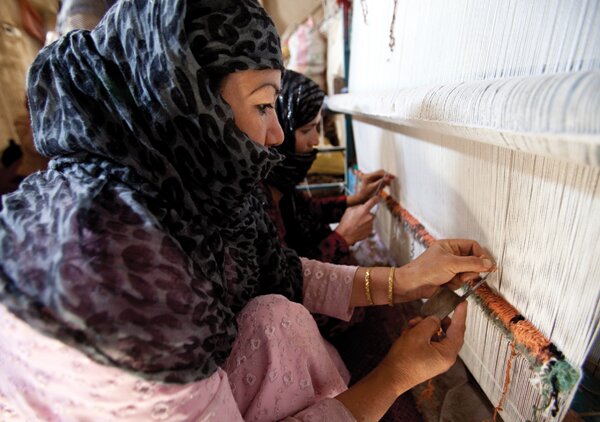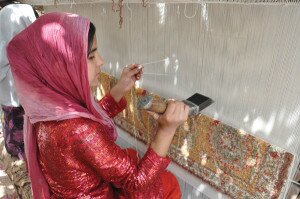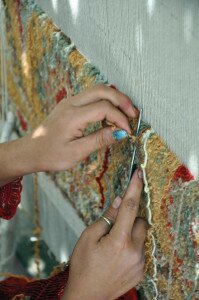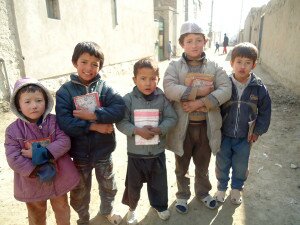A local initiative is helping spin a sustainable future for families in Afghanistan
If you’ve got your eye on a fancy rug in Yas Mall, then you can thank a local social enterprise for bringing it to the UAE.
The carpets are produced by employees of the Fatima Bint Mohammed Initiative (FBMI),
which was formed in 2010.
Aware of the lack of opportunities and mistreatment of women in Afghanistan, Sheikha Fatima Bint Mohammed bin Zayed, the daughter of HH Sheikh Mohammed Bin Zayed, Crown Prince of Abu Dhabi and Deputy Supreme Commander of the UAE Armed Forces, set up an initiative to get women into work so they can empower themselves.
Together with Maywand Jabarkhyl, the executive director of FBMI, the young Emirati entrepreneur came up with a concept that uses a skill the women already possess to give them a sustainable future.
The employees create handmade rugs from start to finish that are then sold to foreign markets.
Maywand tells us, “A lot of international projects inside Afghanistan have failed because they’re just not sustainable.
“We had to give our employees a way to market their products, which is one of the biggest challenges for grassroots initiatives. We had to make sure FBMI was commercially viable.”
FBMI began with 2,800 employees and now has over 4,000, including administrators, management and a marketing team. Seventy per cent are women, half of whom are widows.
There are three centres in Afghanistan that each house a production and weaving facility, a clinic, nursery and warehouse. The flagship centre is a 40,000sqm facility in the capital Kabul, from which 300 female employees work.
The remaining employees work from home, where they are provided with the materials they need.
“One of the great things about this project is that it’s supporting the people who need it most,” adds Maywand.
“At the end of the day it’s about dignity. No matter what they’ve been through they still don’t want hand-outs. They want jobs so they can provide for their families because they know donations won’t last forever.”
As part of FBMI’s mission, the entire production process is kept inside Afghanistan. They begin by purchasing indigenous Afghan wool from local villages. The wool is then washed, sorted and spun. Each activity is done by hand to keep the women employed.
“When you speak to someone about the handmade carpet industry they think the employees aren’t paid well or treated fairly,” says Maywand. “This is something that’s common in countries such as Iran, India, Pakistan and Turkey. But we pay fair market wages.”
FBMI’s employees earn anywhere from $3 (AED 11) to $15 (AED 55) a day, depending on their position and productivity. The minimum daily wage in Afghanistan is $2.90 (AED 10.65).
The women start as spinners and cleaners. After six months they’re given vocational training, and within a year they move onto weaving at the loom for a higher wage.
Maywand adds, “The profits go directly to the women. Once we take out the cost of the carpet, 80 per cent goes to the women and 20 per cent goes into research and development – building new centres, developing new designs and so on.”
One of the main objectives of FBMI is employee welfare. Women who work for the initiative sign a social contract. They are given access to healthcare twice a month, education for their children and counselling on topics such as basic hygiene.
Children under 16 are sent to school full time and the initiative’s education department works closely with teachers to monitor their attendance.
“Before FBMI, mothers didn’t have access to jobs so they had to send children to beg,” Maywand says. “Approximately 50-60 per cent of Afghanistan’s population are youths so keeping them educated is important for the future of the country.”
Healthcare providers visit the villages twice a month to look after the employees and the rest of the community, with particular attention given to pregnant women.
The Designs
The team at FBMI puts a lot of research into the types of carpet designs that sell well in the market.
Aside from washers, spinners and weavers, FBMI also employs university students in Afghanistan who train as designers.
“Today, there is software available that can produce a design in five minutes. But we do everything by hand so that we can continue to employ people and keep the tradition alive,” adds Maywand.
The process of making a rug by hand can be lengthy. For women who work from home, it may be a community effort where family members and neighbours help weave from day to night.
“On average, a 6sqm carpet takes four months to produce, with at least four women working on it.” The initiative’s biggest project to date was a 102sqm carpet that they plan to display in the town square in Yas Mall soon. It took two years to make.
“It’s the biggest carpet ever woven inside Afghanistan. There are carpets that are bigger but they’re woven in Pakistan and exported to Afghanistan.”
Yas Mall boutique
FBMI’s flagship store opened on the second floor above Géant in Yas Mall in January 2015.
The boutique sells carpets, jewellery, suzani – embroidered cotton cloths – and kilin bags made of thin, flat woven carpet.
There is also a corner where clients can choose from over 1,200 carpet colours and discuss customised designs.
A part-time weaver from Afghanistan demonstrates her work on a loom in the shop window.
“Because our carpets are handmade, the quality and craftsmanship is the best. If you went to a shop they wouldn’t know much about the quality of the carpet or where it came from. We use 100 per cent wool so there’s no shrinkage or colour run and natural vegetable dyes so they maintain their value over time.”
So what does the future hold for FBMI?
“Our aim is to have a centre in each of the 34 Afghan provinces,” Maywand tells us. “Rugs are what Afghanistan is famous for, and the tradition of weaving tells a story about the country.”
Carpets range from AED 500 to AED 3,000 per sqm.
For more information contact: 02 566 9600 www.fbmi.ae
Rachael Peacock



























